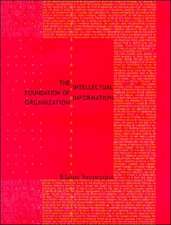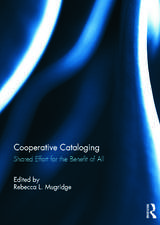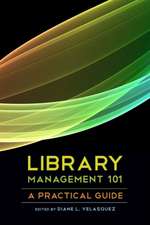The Data Deluge: Can Libraries Cope with E-Science?
Editat de Deanna B. Marcum, Gerald Georgeen Limba Engleză Paperback – 18 noi 2009 – vârsta până la 17 ani
Preț: 350.24 lei
Preț vechi: 431.72 lei
-19% Nou
Puncte Express: 525
Preț estimativ în valută:
67.02€ • 70.16$ • 55.45£
67.02€ • 70.16$ • 55.45£
Carte tipărită la comandă
Livrare economică 05-19 aprilie
Preluare comenzi: 021 569.72.76
Specificații
ISBN-13: 9781591588870
ISBN-10: 1591588871
Pagini: 152
Dimensiuni: 156 x 235 x 13 mm
Greutate: 0.25 kg
Editura: Bloomsbury Publishing
Colecția Libraries Unlimited
Locul publicării:New York, United States
ISBN-10: 1591588871
Pagini: 152
Dimensiuni: 156 x 235 x 13 mm
Greutate: 0.25 kg
Editura: Bloomsbury Publishing
Colecția Libraries Unlimited
Locul publicării:New York, United States
Caracteristici
Comprises essays from nine expert contributors-each an innovator who has successfully integrated E-science programs at their institutions
Notă biografică
Deanna B. Marcum is associate librarian for Library Services at the Library of Congress in Washington, D.C. Gerald George is the former executive director of the National Historical Publications and Records Commission.
Recenzii
These essays present ground-breaking information on this topic and will be of professional interest to practitioners of information science and instructors teaching information science.
Increasingly scientists pursue their craft at keyboards, pulling data from a vast network of sensors such as telescopes and weather stations and research reports from past or present wet-workers in laboratories, fields, and the like. Library professionals here ask who will acquire, evaluate, manage, and preserve all these sets of data for as long as they are needed; who will maintain the infrastructure that makes it all possible; who will provide access points; and who will explain to these scientists how to use the system. They highly suspect that research libraries will play a large role, and that librarians had better be prepared. They begin by reviewing such aspects as an agenda for action, and academic libraries in science data set management and scholarly communication for domain sciences and engineering. Then they offer perspectives from national organizations such as the Council on Library and Information Resources, and from individual research libraries such as Johns Hopkins University.
Increasingly scientists pursue their craft at keyboards, pulling data from a vast network of sensors such as telescopes and weather stations and research reports from past or present wet-workers in laboratories, fields, and the like. Library professionals here ask who will acquire, evaluate, manage, and preserve all these sets of data for as long as they are needed; who will maintain the infrastructure that makes it all possible; who will provide access points; and who will explain to these scientists how to use the system. They highly suspect that research libraries will play a large role, and that librarians had better be prepared. They begin by reviewing such aspects as an agenda for action, and academic libraries in science data set management and scholarly communication for domain sciences and engineering. Then they offer perspectives from national organizations such as the Council on Library and Information Resources, and from individual research libraries such as Johns Hopkins University.












